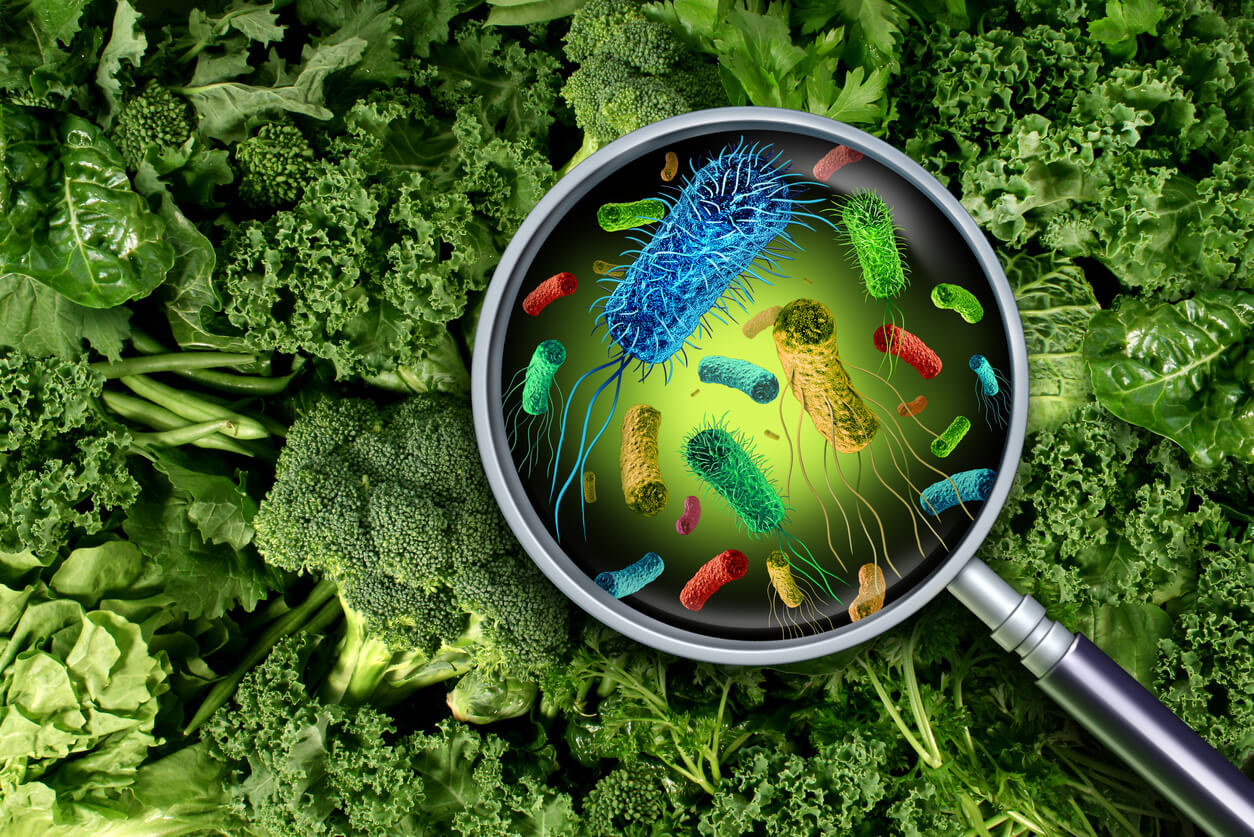First-Trimester Diet: Keys and Recommendations

Optimizing the diet during the first trimester of pregnancy is key for the proper development of the fetus. At this time, there’s no need to make major changes, but it is necessary to be careful with the quality and hygiene of food to avoid food poisoning. Keep reading to learn more about the first-trimester diet.
In addition to dietary care, before pregnancy begins it is necessary to supplement women with folic acid, as the requirements for this nutrient increase significantly during pregnancy. This is optimal, although it’s fine if the respective pharmacological product is incorporated once the test is positive.
Take note of the following dietary recommendations to start the best chapter of your life in the best possible way.
Energy during the first trimester of pregnancy
In the first trimester of pregnancy, it’s not necessary to increase the energy intake of your diet that much, because fetal requirements are still low.
The most important thing at this stage is to ensure a correct supply of micronutrients, improving the quality of food over quantity. In fact, eating a larger volume than necessary could be harmful and predispose the mother to certain gestational diseases.
At the same time, you should take into account that in the first months, nausea and vomiting may be experienced. These symptoms limit intake, but can be combated with some natural remedies, such as ginger.

Essential nutrients for the first-trimester diet
As we’ve already mentioned, from a nutritional point of view, it’s necessary to make certain changes in your diet.
First of all, it’s good to increase the intake of folic acid and iron. The former is a key vitamin for preventing fetal diseases derived from the inadequate closure of the neural tube, as evidenced by research published in the journal BMC Medicine.
Iron is also an important element, as its deficiency leads to anemia, a condition that hinders the arrival of oxygen to the tissues. In fact, during pregnancy, the mother’s body blood volume increases and this fluid tends to “dilute” more than usual. This phenomenon leads the pregnant woman to enter a state of physiological anemia, so the mineral requirements increase naturally.
At the same time, it’s important to adjust the protein intake of pregnant women. We’re talking about a nutrient that’s often lacking in many diets, but which is key to ensuring proper tissue growth. Especially during pregnancy. At least half of the proteins in the diet must be of animal origin, as they have a high biological value.
Food hygiene
Another important point to consider in the first-trimester diet is food hygiene. At this time, raw foods or foods with a high microbiological risk, such as sausages or unpasteurized dairy products, should be avoided.
Although food poisoning isn’t usually complex for an adult woman, it can be for a pregnant woman. Due to the natural deficit in her immunity, it could cause serious damage to her health and that of her baby. It could even cause a spontaneous miscarriage.
Special care must be taken with eggs and you should ensure that they’re well cooked before eating them. Also, restrict high-risk preparations, such as sushi or bluefish, as they contain large amounts of heavy metals.
Finally, extreme care should be taken with food hygiene practices and washing hands with soap and water before eating or cooking.

Improve your diet during the first trimester of pregnancy
As you’ve seen, it’s key to follow a series of dietary modifications during the first trimester of pregnancy in order to avoid risks and ensure the proper development of the fetus. It’s not difficult to adopt these habits, as there are few aspects to take into account.
The main key is to propose a varied and balanced diet, without increasing calories excessively.
Finally, keep in mind that the rejection of certain foods is common at this time because it’s a period of great change at the hormonal level. All this can cause vomiting or preferences for certain types of food, so it’s best to listen to your body. Of course, don’t fail to meet the needs of essential nutrients.
Optimizing the diet during the first trimester of pregnancy is key for the proper development of the fetus. At this time, there’s no need to make major changes, but it is necessary to be careful with the quality and hygiene of food to avoid food poisoning. Keep reading to learn more about the first-trimester diet.
In addition to dietary care, before pregnancy begins it is necessary to supplement women with folic acid, as the requirements for this nutrient increase significantly during pregnancy. This is optimal, although it’s fine if the respective pharmacological product is incorporated once the test is positive.
Take note of the following dietary recommendations to start the best chapter of your life in the best possible way.
Energy during the first trimester of pregnancy
In the first trimester of pregnancy, it’s not necessary to increase the energy intake of your diet that much, because fetal requirements are still low.
The most important thing at this stage is to ensure a correct supply of micronutrients, improving the quality of food over quantity. In fact, eating a larger volume than necessary could be harmful and predispose the mother to certain gestational diseases.
At the same time, you should take into account that in the first months, nausea and vomiting may be experienced. These symptoms limit intake, but can be combated with some natural remedies, such as ginger.

Essential nutrients for the first-trimester diet
As we’ve already mentioned, from a nutritional point of view, it’s necessary to make certain changes in your diet.
First of all, it’s good to increase the intake of folic acid and iron. The former is a key vitamin for preventing fetal diseases derived from the inadequate closure of the neural tube, as evidenced by research published in the journal BMC Medicine.
Iron is also an important element, as its deficiency leads to anemia, a condition that hinders the arrival of oxygen to the tissues. In fact, during pregnancy, the mother’s body blood volume increases and this fluid tends to “dilute” more than usual. This phenomenon leads the pregnant woman to enter a state of physiological anemia, so the mineral requirements increase naturally.
At the same time, it’s important to adjust the protein intake of pregnant women. We’re talking about a nutrient that’s often lacking in many diets, but which is key to ensuring proper tissue growth. Especially during pregnancy. At least half of the proteins in the diet must be of animal origin, as they have a high biological value.
Food hygiene
Another important point to consider in the first-trimester diet is food hygiene. At this time, raw foods or foods with a high microbiological risk, such as sausages or unpasteurized dairy products, should be avoided.
Although food poisoning isn’t usually complex for an adult woman, it can be for a pregnant woman. Due to the natural deficit in her immunity, it could cause serious damage to her health and that of her baby. It could even cause a spontaneous miscarriage.
Special care must be taken with eggs and you should ensure that they’re well cooked before eating them. Also, restrict high-risk preparations, such as sushi or bluefish, as they contain large amounts of heavy metals.
Finally, extreme care should be taken with food hygiene practices and washing hands with soap and water before eating or cooking.

Improve your diet during the first trimester of pregnancy
As you’ve seen, it’s key to follow a series of dietary modifications during the first trimester of pregnancy in order to avoid risks and ensure the proper development of the fetus. It’s not difficult to adopt these habits, as there are few aspects to take into account.
The main key is to propose a varied and balanced diet, without increasing calories excessively.
Finally, keep in mind that the rejection of certain foods is common at this time because it’s a period of great change at the hormonal level. All this can cause vomiting or preferences for certain types of food, so it’s best to listen to your body. Of course, don’t fail to meet the needs of essential nutrients.
All cited sources were thoroughly reviewed by our team to ensure their quality, reliability, currency, and validity. The bibliography of this article was considered reliable and of academic or scientific accuracy.
- Lindblad, A. J., & Koppula, S. (2016). Ginger for nausea and vomiting of pregnancy. Canadian family physician – Medecin de famille canadien, 62(2), 145.
- McNulty, H., Rollins, M., Cassidy, T., Caffrey, A., Marshall, B., Dornan, J., McLaughlin, M., McNulty, B. A., Ward, M., Strain, J. J., Molloy, A. M., Lees-Murdock, D. J., Walsh, C. P., & Pentieva, K. (2019). Effect of continued folic acid supplementation beyond the first trimester of pregnancy on cognitive performance in the child: a follow-up study from a randomized controlled trial (FASSTT Offspring Trial). BMC medicine, 17(1), 196. https://doi.org/10.1186/s12916-019-1432-4
This text is provided for informational purposes only and does not replace consultation with a professional. If in doubt, consult your specialist.








